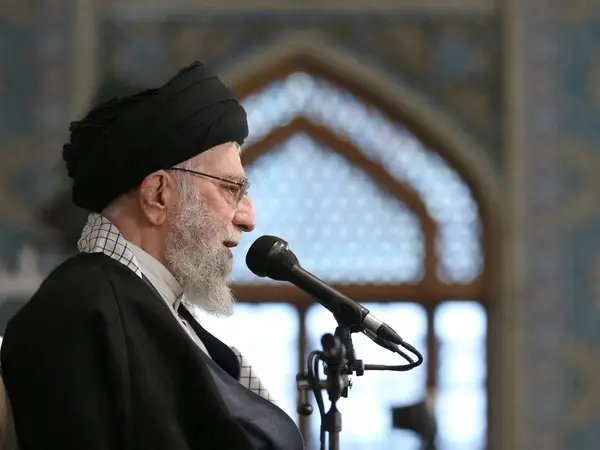In his vitriolic new year speech, Iran’s Supreme Leader claimed the US president and European heads of state arm the country’s revolutionaries.
“During recent unrest, the US president and heads of states of certain European countries openly offered weapons and financial and security support to rioters to weaken the Islamic Republic but what happened was the opposite,” he said, in spite of the country being in its worst economic recession for decades and all but isolated on the world stage.
The allegation was one of many thrown at the West in a new year speech Tuesday, amidst outright denials of Iran’s having sent drones to Russia for use in its invasion of Ukraine. “We categorically deny any presence in the Ukraine war and such a thing is not true at all,” he said.
The remarks show little has changed in the regime rhetoric after more than six months of protests calling for an end to the Islamic dictatorship.
Khamenei, whose public speeches are always peppered with scathing criticism of the West, said not only has the ‘enemy’ fanned the flames of unrest in the country, triggered by the death in custody of Iranian-Kurd, Mahsa Amini, but claimed the West’s goal is to topple the regime and in turn, see “Islam fade into oblivion”.
It is what he terms a “hybrid war” against Iran waged by the West to undermine clerical rule, a propaganda war to “undermine the nation’s will, sow despair among the youth, and make them disappointed at the future, work, and progress by fudging the facts”.
This emphasis on such conspiracies are meant to deflect attention from the fact that Iran’s economy is in crisis and young people have lost all hope for their future, yearning for cultural and personal freedoms away from suffocating religious laws.
Khamenei who espouses a 20th-century leftist ideology of anti-imperialism also accused the West of having colonial designs on Iran. “In everything they do, they seek to politically and economically dominate Iran and plunder it,” he maintained.
Perhaps reflecting his deep resentment towards Saudi Arabia, which is no secret, Iran’s 83-year old authoritarian ruler failed to mention a recent agreement with the oil-rich Persian Gulf state to normalize relations, despite the fact that the deal announced earlier this month came as a diplomatic earthquake in the region and possibly the biggest diplomatic victory for Iran in years.
Removing it from isolation from one of the region’s biggest powers, the deal has brought Iran in from the cold at a time when it has become a pariah on the world stage, not least, since the collapse of nuclear talks, the JCPOA, after Iran's intransigence in negotiations.
Khamenei has long labelled the Saudi ruling elite as “corrupt” and un-Islamic, but approved restoration of ties amid its own isolation.
Recently, more and more politicians and commentators in Iran call for an opening to the world, arguing that in the 21st century no country can succeed alone. The Iranian regime’s ongoing nuclear program and its support for dangerous militant groups around the region have further isolated the country both politically and economically.
Showing no signs of weakening these proxy groups based in several countries including Lebanon and Iraq, in addition to cells far beyond the Arab world, Khamenei also reiterated support for what he calls his “axis of resistance”.
While it is hoped that the Saudi deal will mean Iran’s disarming the Houthis in Yemen, skeptics suspect the regime will not alter its policy of arming its proxies around the region. It is as yet unclear if the Houthis too, will agree to disarming.
While relations with the West continue to nosedive, Khamenei claimed that “the West’s efforts to isolate Iran have failed,” praising his policy of forging closer relations with dictatorships China and Russia, what he has dubbed as a policy of “looking East”
He had little to say on matters of economy to reassure the people that the worst recession in decades showed any sign of abating.
Economically, Iran has fallen behind even in the oil and natural gas sectors which represent its main sources of foreign currency revenues needed for economic development. Its energy sector needs upwards of $200 billion in investments, according to its own oil minister Javad Owji, in spite of the country sitting on the world’s second biggest oil fields.
In a bizarre twist, Khamenei said that Iran should even ditch the US dollar after months of sharp declines in the value of the rial, claiming that several sanctioned countries which stopped using the dollar found “their situation got better”. He failed to give examples of such wild claims.
The fate of the country remains in the hands of an aging leader with old-fashioned diplomatic and economic policies. It may be a new year for Iran, but it is still, old rhetoric which dogs its leadership.
